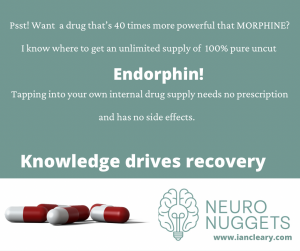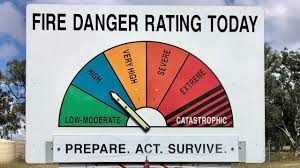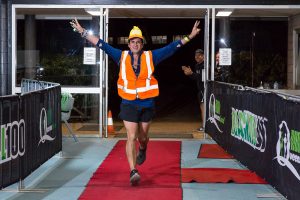Talking all things Pain & Fatigue
I sat down with Adam Stanecki for his Digging Deep Podcast recently and chatting all things pain, fatigue and fear.
- New directions in Pain research
- Understanding Pain & Fatigue & Anxiety
- Some great first steps & obstacles to change
Enjoy.
Like a lock & key, morphine fits into a special receptor & click, it works it’s magic on pain. BUT the ‘lock’ inside you that morphine works on isn’t actually made to be opened by morphine (or other artificial opioids). What’s the real KEY?
Like Dorothy and her magic slippers that were with her the entire time, you are walking around with the real KEY – a substance 40 times more powerful than morphine because it’s an exact fit for the ‘lock’.
ENDORPHIN!
Tapping into your internal medicine cabinet needs no prescription and has no side effects.
Knowledge drives recovery!
Does the Lightning Process Training Programme Reduce Chronic Fatigue in Adolescent and Young Adult Cancer Survivors?
(Cancers 2021, 13(16), 4076)
Another research study was published about the Lightning Process.
It is a mixed methods study of the effects of the Lightning Process on cancer survivors with chronic fatigue and has shown promising results.
Chronic fatigue is a severe side-effect commonly experienced by many who have recovered from cancer. It is often debilitating and unresponsive to treatment. The Lightning Process was evaluated as a potential solution for this issue due to previous promising evidence concerning its effects on fatigue.
Results
This study found statistically significant improvements for all the patient-reported outcome measure (PROM) questionnaires comparing the pre- and post-intervention periods, with a significant reduction (p < .001) in the total fatigue score from baseline to 3 months and six month follow-up. This was reflected in the qualitative findings of the interviews where ‘participants emphasised that they now experienced both less fatigue and explicit improvement in their energy level’.
All 11 participants confirmed that the intervention had not worsened their health or caused them any negative side effects and that they were satisfied or very satisfied with intervention. They also expressed that during the LP they felt they were ‘finally being taken seriously’ and the researchers noted how the LP course explicitly validated the participants’ symptoms as being real rather than ‘imagined’.
The researchers noted that ‘The reductions in the participants’ total fatigue scores were remarkable, since no changes in their overall level of fatigue, as subjectively expressed by the participants themselves, were reported over the preceding years.’
You can find the complete paper here: https://www.mdpi.com/2072-6694/13/16/4076/htm
Post Cancer fatigue
I recently wrote an article on the nature of fatigue and the idea that fatigue / tiredness is not a lack of biological energy, but rather a form of protective response to a perceived threat.
With the brain being plastic and changeable with experience, a past threat can seemingly alter brain function to maintain the protective response of fatigue well after the threat has past.
Hence we get Post Viral Fatigue long after the viral threat has gone. Real fatigue, just no longer appropriate.
A common issue for those who have survived cancer treatment is Post Chemo fatigue. Does the same principle apply for Post Cancer Fatigue?
A paper came out in the journal Cancer today asking the question:
Does the Lightning Process Training Programme Reduce Chronic
Fatigue in Adolescent and Young Adult Cancer Survivors?
Fauske, L.; Bruland, Ø.S.; Dahl, A.A.; Myklebostad, A.; Reme, S.E. Does the Lightning Process Training Programme Reduce Chronic Fatigue in Adolescent and Young Adult Cancer Survivors? A Mixed-Methods Pilot Study. Cancers 2021, 13, 4076. https://doi.org/10.3390/cancers13164076
Is Fatigue a lack of Energy?

|
Fire & Your Brain
As fire season starts I’m reminded of my work on fire crews when I was younger. Little did I know that my work testing moisture in leaf litter or plugging in wind speeds would give profound insight into the brain and pain & fatigue.
Question?
Who is better protected from catastrophe – a town with a super-fast fire crew that can respond as soon as the first whisp of smoke is detected OR a town that can predict in advance of a catastrophic fire season and set off the warming bells early and take necessary action?
The answer is that it is safer to predict well than respond quickly.
That is also the brain’s key strategy – it protects and serves us by predicting. BUT HOW?
Well those fire signs we see are not just a person sticking their head out the window and getting a ‘feel’ for the day. They methodically measure temperature, wind, moisture levels AND have a programme that looks at how that relates to PAST fires. It’s the PAST that helps us predict our safety on any given day. OUR PAST is how we predict the FUTURE. The measurements are meaningly unless we compare them to the PAST.
And so it is with the brain. If you haven’t figured it out by all those red highlighted words : OUR PAST IS HUGELY INFLUENTIAL IN HOW OUR BRAIN RESPONDS
Those who have been following my Lightning Process emails know that the approach looks at the role our brain plays in our physical and mental well-being.
Our brains are always changing and adapting to experience (Neuroplasticity). A key fact about the brain is this simple but profound concept … rather than responding to the PRESENT moment, our brains are actually predicting what will happen NEXT and protecting us from that predicted FUTURE. It does this by looking at patterns of the PAST. Like a town preparing for a future fire season. So technically the brain is not responding to the moment to keep you safe – it is predicting what you need to stay safe based on your PAST. That’s worth pondering – Your brain is trying to keep you safe by looking at your past.
So – your past matters in your brain function. Your responses are unique to you because your past is unique to you.
Long periods of historic stress, adverse childhood experiences (abuse, neglect, household dysfunction) or intense traumatic experiences in our past are highly influential in brain function.
Long periods of stress in our past are associated with an over-protective brain. We might actually be safe now but the brain isn’t focused on the present. It’s focused on the PAST and predicting the future.
Think how this might be relevant to anxiety or Post Traumatic Stress Disorder.
But we don’t have to be at the mercy of our past. With focused attention and effort we can retrain our brains. That’s what I call ‘Self-directed Neuroplastic Change’.
How might YOUR brain be responding historically rather than appropriately? As a reminder, a ‘response’ could be your stress response, your behavioural responses, your emotional response or even a neurological response like pain and fatigue. (YES – those last 2 are neurological protective responses. This pain TED talk might be a good refresher.)
As we enter a new year our brains will be looking to our past to figure out how best to approach 2021. Sometimes that is useful and sometimes it creates an over-protective response. We don’t have be at the mercy of our past.
Past traumas, threats, stresses and challenges can change how the brain responds. Past stress is associated with over-protective responses. Past stress can create a fear-based brain and introduce biases in how the brain determines what is a threat. Ongoing stress can change the brain so that it can start to respond to safe things as if they are dangerous – very real and physical responses triggered by an over-protective brain.
Pain, fatigue, fear, immune responses, stress, avoidance, emotional responses and ways of thinking can all protect us AND over-protect us. A key finding in neuroscience is that in time the brain changes (NEUROPLASTCITY) and we are stuck responding historically rather than appropriately.
Are you ready to retrain your brain?
WHERE TO START
It does take focused effort to retrain an over-protective brain but the brain IS the most trainable organ we have. If you feel ready for a brain-based approach I would recommend downloading the LP Audiobook. It guides people through the concepts behind the training and will help you decide if you feel ready to do the work required. Download HERE. You can also simply email to arrange a time to talk through the programme and your own situation.
ONLINE LIGHTNING PROCESS
My Lightning Process online 3 day trainings run twice a month in live video sessions available anywhere across Australia & New Zealand.
Break the cycle of the past – Simply contact me for more information.
Lightning Process Research
Lightning Process Research
Below is a recently published paper which reviews current research into the Lightning Process.
Systematic review of the Lightning Process finds an ’emerging body of evidence supporting the efficacy of the LP for many participants with fatigue, physical function, pain, anxiety and depression.’
https://www.sciencedirect.com/science/article/abs/pii/S1550830720302330
Abstract
Background: The Lightning Process (LP), a mind-body training programme, has been applied to a range of health problems and disorders. Studies and surveys report a range of outcomes creating a lack of clarity about the efficacy of the intervention.
Objective: This systematic review evaluates the methodological quality of existing studies on the LP and collates and reviews its reported efficacy.
Data sources: Five databases, PsycINFO, PubMed, CINAHL, Embase, ERIC (to September 2018), and Google and Google Scholar were searched for relevant studies.
Study Selection: Studies of the LP in clinical populations published in peer-reviewed journals or in grey literature were selected. Reviews, editorial articles and studies/surveys with un-reported methodology were excluded.
Data extraction: Searches returned 568 records, 21 were retrieved in full text of which 14 fulfilled the inclusion criteria (ten quantitative studies/surveys and four qualitative studies).
Data synthesis and Conclusions: The review identified variance in the quality of studies across time; earlier studies demonstrated a lack of control groups, a lack of clarity of aspects of the methodology and potential sampling bias. Although it found a variance in reported patient outcomes, the review also identified an emerging body of evidence supporting the efficacy of the LP for many participants with fatigue, physical function, pain, anxiety and depression. It concludes that there is a need for more randomised controlled trials to evaluate if these positive outcomes can be replicated and generalised to larger populations.
Lightning Process success stories
“If they can do so can you”
Before taking anyone through a Lightning Process training, each client must first get really clear about their goals. It’s not enough to desperately want to get rid of pain, fatigue, anxiety, trauma etc. There needs to be a reason bigger than what they are leaving behind. Something in their future that will keep them focused to keep going.
Then from Day 1 they go out and start making progress. From DAY ONE. They put into practice their new knowledge & skills – neither pushing through or avoiding – but progressing.
It’s so inspiring to watch. These people have been through HELL, and having so many past failures, they still boldly take a stand and retrain their brain and body to respond differently – to exercise, light, sleep, movement, people, food etc.
It takes work but that vision of what’s on the other side keeps them going.
Twice a month I witness extraordinary individuals update their understanding of the BRAIN and its role in pain, fatigue, fear – and then knuckle down and do the work.
The work they take on may not seem extraordinary to some – go for a walk, leave the house, eat a slice of pizza, stay out late, ride a bus, socialise at night time with friends after a full days training! For many these things seem insurmountable and on Day 1 full health seems a long way off. But out they go each afternoon. Day 1, Day 2, Day 3 and they keep going.
“IF THEY CAN DO IT SO CAN YOU”
Inspired by my clients, each year I set myself a task. A goal that terrifies ME and requires work. I use all the inspiration from past clients to work towards it.
They tend to be endurance events that give extra meaning to my ‘pain and fatigue specialist’ title. As I run through the day (and sometimes night) the hours kick by. At times the hills seem insurmountable, the finish line seems a long long way off.
BUT…… it is the names and stories of past graduates that run through my head. I replay their conversations, their weekly success, their challenges to stay on track, the photos and postcards they send.
I hear myself say “If they can do it then so can you”.
So thank you to all past LP Graduates for your inspiration.
So 2020 task completed. A 100km race through the mountains on a stinker of a day!
To anyone who is going through HELL it’s useful to know that others have been there and have found their way out. Chronic does not mean permanent.
If the obstacles seem insurmountable and vibrant health seems impossible it might be time to look at things from a fresh perspective. What role does our brain, our most trainable and adaptable organ, play in physical health.
Below is a link to some people’s success stories. If they can do it – can you? People like you, who were told there is no cure, who had tried everything, who were sceptical and unsure, but threw themselves into the training, are now getting on with their lives.
You can read some of their stories HERE.





